Analysis of Information Overload and Its Adverse Effects on Facebook
VerifiedAdded on 2022/08/21
|9
|2612
|12
Essay
AI Summary
This essay examines the detrimental effects of information overload in the digital age, with a specific focus on the social media platform Facebook. It explores how the constant influx of information leads to a state of "representation without understanding," as described by Jodi Dean. The paper analyzes the role of data mining, sentiment analysis, and neuromarketing in manipulating consumer behavior and eroding individual rights. It highlights how corporations exploit user data to influence purchasing decisions, creating a situation where individuals' free will is compromised. The essay references various studies to support its arguments, discussing how the abundance of information, combined with the practices of bloggers, news agencies, and corporations, contributes to a totalitarian environment where individuals' thoughts and actions are subtly controlled. The conclusion emphasizes the need for critical analysis and discernment in navigating the information-rich landscape of the modern world.
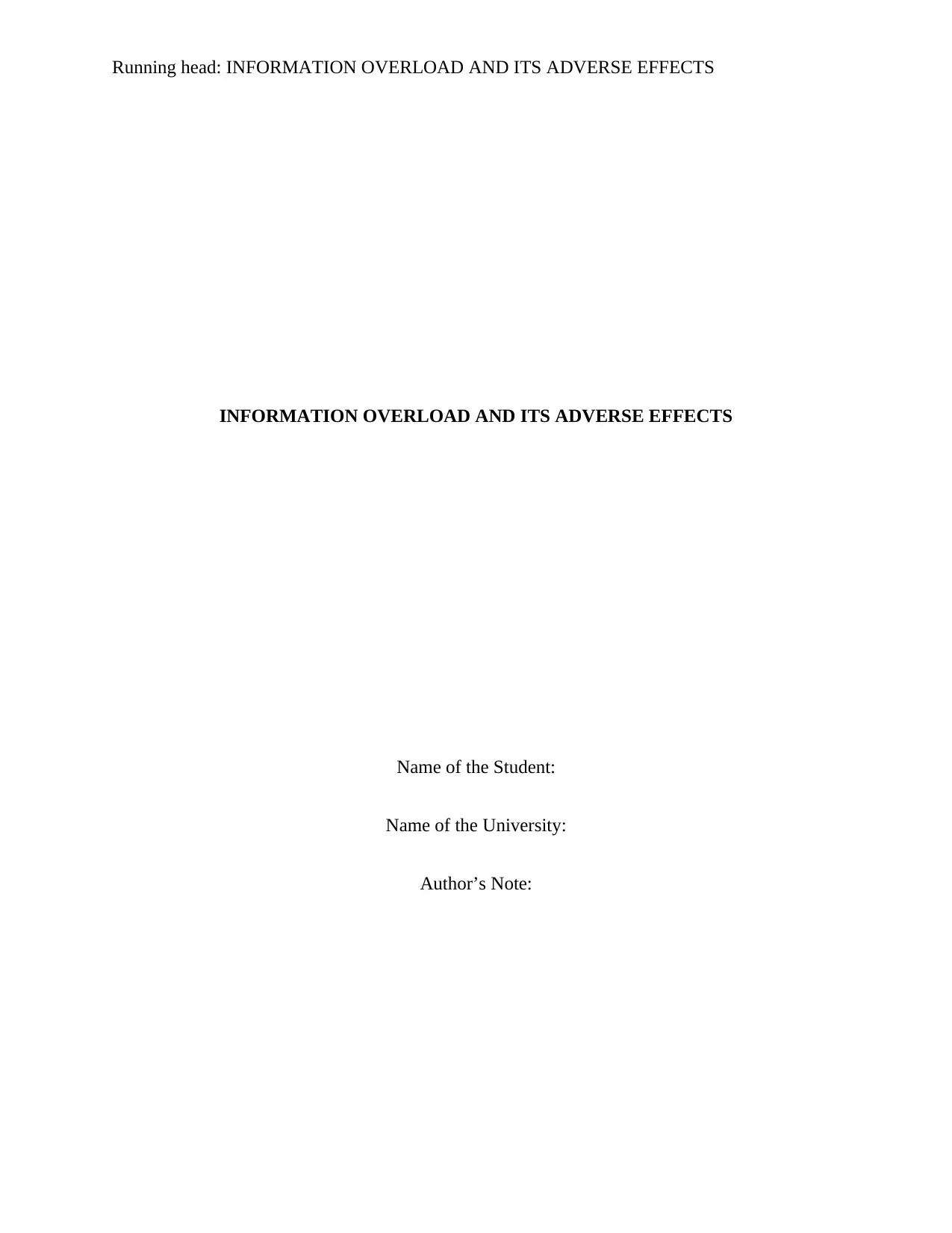
Running head: INFORMATION OVERLOAD AND ITS ADVERSE EFFECTS
INFORMATION OVERLOAD AND ITS ADVERSE EFFECTS
Name of the Student:
Name of the University:
Author’s Note:
INFORMATION OVERLOAD AND ITS ADVERSE EFFECTS
Name of the Student:
Name of the University:
Author’s Note:
Paraphrase This Document
Need a fresh take? Get an instant paraphrase of this document with our AI Paraphraser
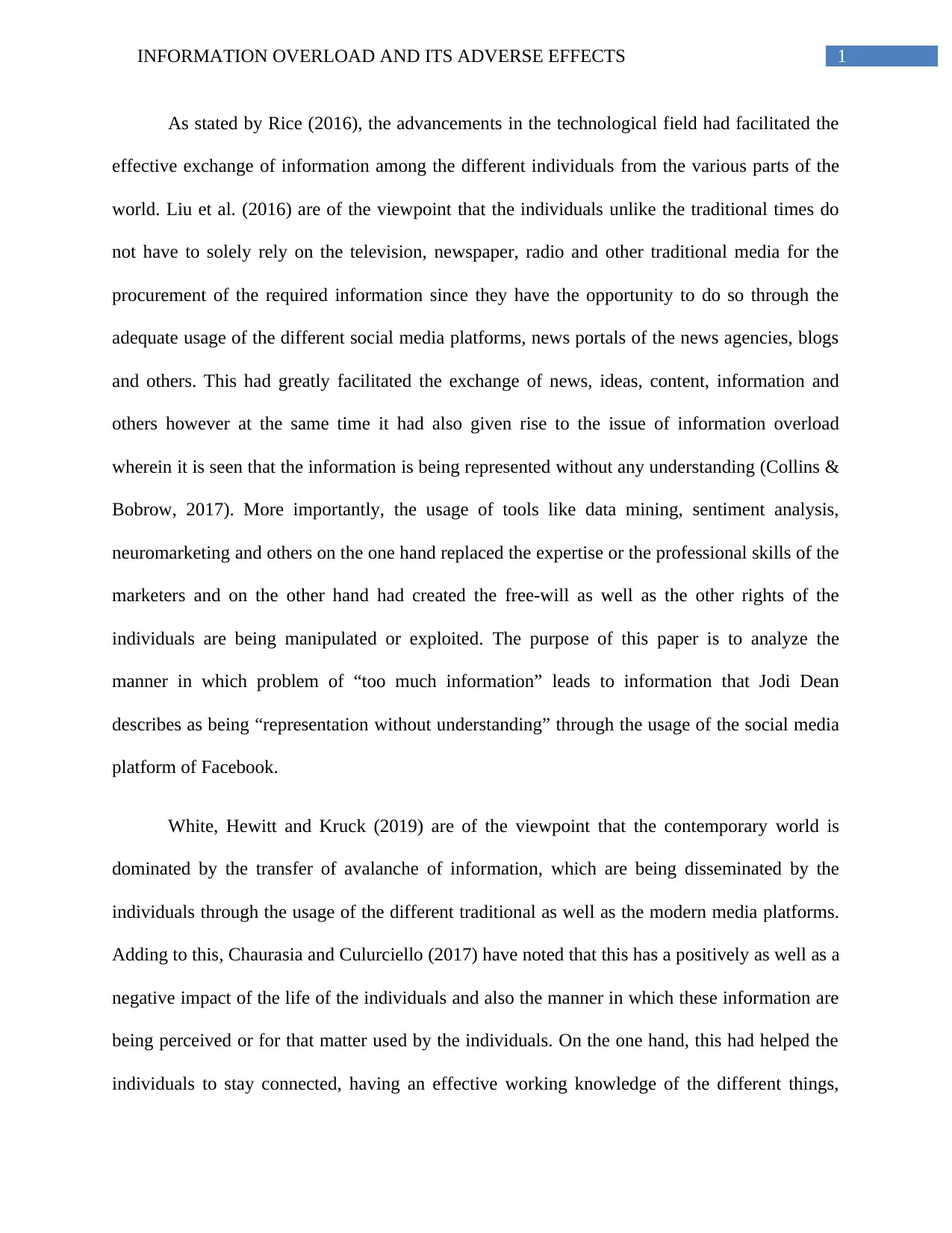
1INFORMATION OVERLOAD AND ITS ADVERSE EFFECTS
As stated by Rice (2016), the advancements in the technological field had facilitated the
effective exchange of information among the different individuals from the various parts of the
world. Liu et al. (2016) are of the viewpoint that the individuals unlike the traditional times do
not have to solely rely on the television, newspaper, radio and other traditional media for the
procurement of the required information since they have the opportunity to do so through the
adequate usage of the different social media platforms, news portals of the news agencies, blogs
and others. This had greatly facilitated the exchange of news, ideas, content, information and
others however at the same time it had also given rise to the issue of information overload
wherein it is seen that the information is being represented without any understanding (Collins &
Bobrow, 2017). More importantly, the usage of tools like data mining, sentiment analysis,
neuromarketing and others on the one hand replaced the expertise or the professional skills of the
marketers and on the other hand had created the free-will as well as the other rights of the
individuals are being manipulated or exploited. The purpose of this paper is to analyze the
manner in which problem of “too much information” leads to information that Jodi Dean
describes as being “representation without understanding” through the usage of the social media
platform of Facebook.
White, Hewitt and Kruck (2019) are of the viewpoint that the contemporary world is
dominated by the transfer of avalanche of information, which are being disseminated by the
individuals through the usage of the different traditional as well as the modern media platforms.
Adding to this, Chaurasia and Culurciello (2017) have noted that this has a positively as well as a
negative impact of the life of the individuals and also the manner in which these information are
being perceived or for that matter used by the individuals. On the one hand, this had helped the
individuals to stay connected, having an effective working knowledge of the different things,
As stated by Rice (2016), the advancements in the technological field had facilitated the
effective exchange of information among the different individuals from the various parts of the
world. Liu et al. (2016) are of the viewpoint that the individuals unlike the traditional times do
not have to solely rely on the television, newspaper, radio and other traditional media for the
procurement of the required information since they have the opportunity to do so through the
adequate usage of the different social media platforms, news portals of the news agencies, blogs
and others. This had greatly facilitated the exchange of news, ideas, content, information and
others however at the same time it had also given rise to the issue of information overload
wherein it is seen that the information is being represented without any understanding (Collins &
Bobrow, 2017). More importantly, the usage of tools like data mining, sentiment analysis,
neuromarketing and others on the one hand replaced the expertise or the professional skills of the
marketers and on the other hand had created the free-will as well as the other rights of the
individuals are being manipulated or exploited. The purpose of this paper is to analyze the
manner in which problem of “too much information” leads to information that Jodi Dean
describes as being “representation without understanding” through the usage of the social media
platform of Facebook.
White, Hewitt and Kruck (2019) are of the viewpoint that the contemporary world is
dominated by the transfer of avalanche of information, which are being disseminated by the
individuals through the usage of the different traditional as well as the modern media platforms.
Adding to this, Chaurasia and Culurciello (2017) have noted that this has a positively as well as a
negative impact of the life of the individuals and also the manner in which these information are
being perceived or for that matter used by the individuals. On the one hand, this had helped the
individuals to stay connected, having an effective working knowledge of the different things,
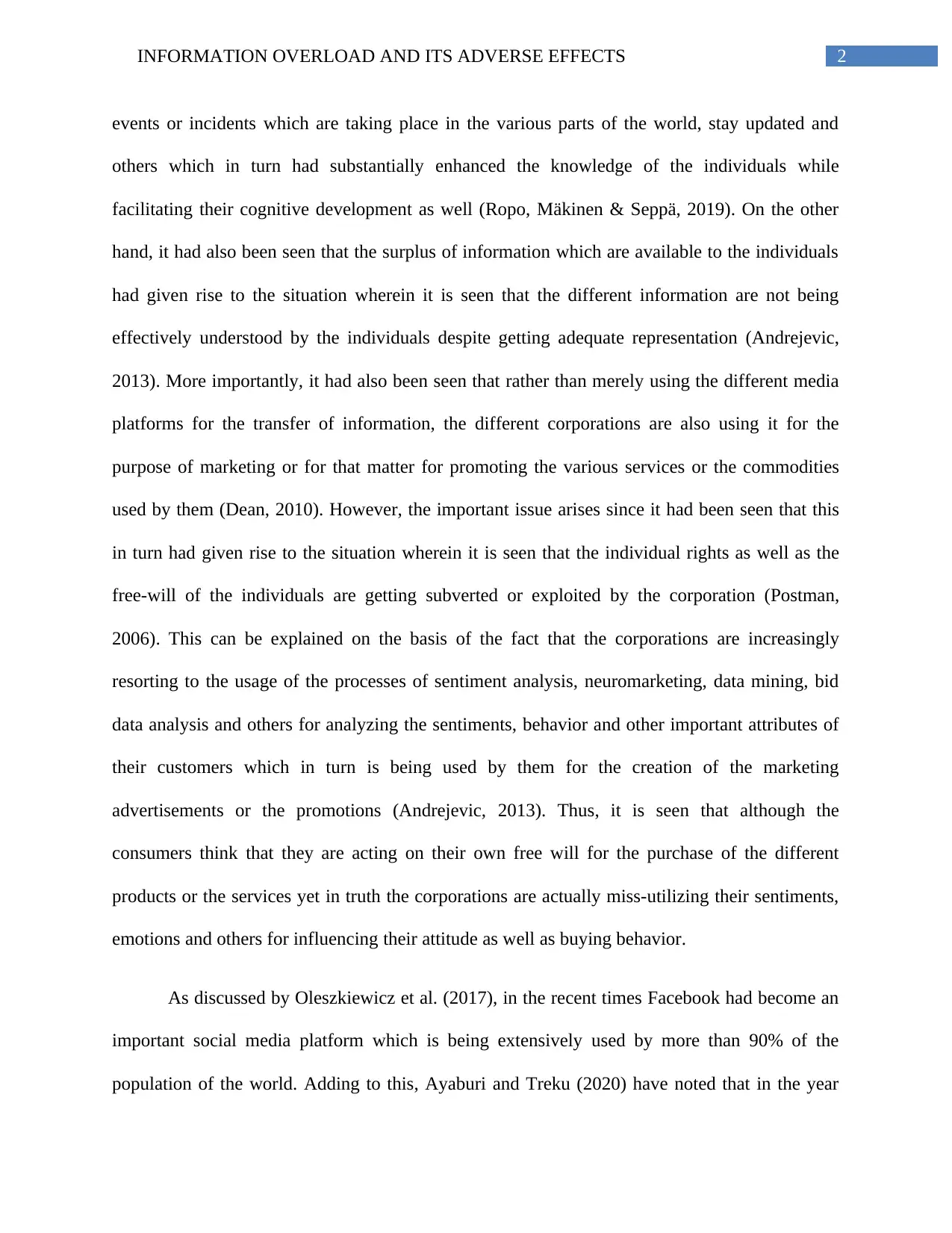
2INFORMATION OVERLOAD AND ITS ADVERSE EFFECTS
events or incidents which are taking place in the various parts of the world, stay updated and
others which in turn had substantially enhanced the knowledge of the individuals while
facilitating their cognitive development as well (Ropo, Mäkinen & Seppä, 2019). On the other
hand, it had also been seen that the surplus of information which are available to the individuals
had given rise to the situation wherein it is seen that the different information are not being
effectively understood by the individuals despite getting adequate representation (Andrejevic,
2013). More importantly, it had also been seen that rather than merely using the different media
platforms for the transfer of information, the different corporations are also using it for the
purpose of marketing or for that matter for promoting the various services or the commodities
used by them (Dean, 2010). However, the important issue arises since it had been seen that this
in turn had given rise to the situation wherein it is seen that the individual rights as well as the
free-will of the individuals are getting subverted or exploited by the corporation (Postman,
2006). This can be explained on the basis of the fact that the corporations are increasingly
resorting to the usage of the processes of sentiment analysis, neuromarketing, data mining, bid
data analysis and others for analyzing the sentiments, behavior and other important attributes of
their customers which in turn is being used by them for the creation of the marketing
advertisements or the promotions (Andrejevic, 2013). Thus, it is seen that although the
consumers think that they are acting on their own free will for the purchase of the different
products or the services yet in truth the corporations are actually miss-utilizing their sentiments,
emotions and others for influencing their attitude as well as buying behavior.
As discussed by Oleszkiewicz et al. (2017), in the recent times Facebook had become an
important social media platform which is being extensively used by more than 90% of the
population of the world. Adding to this, Ayaburi and Treku (2020) have noted that in the year
events or incidents which are taking place in the various parts of the world, stay updated and
others which in turn had substantially enhanced the knowledge of the individuals while
facilitating their cognitive development as well (Ropo, Mäkinen & Seppä, 2019). On the other
hand, it had also been seen that the surplus of information which are available to the individuals
had given rise to the situation wherein it is seen that the different information are not being
effectively understood by the individuals despite getting adequate representation (Andrejevic,
2013). More importantly, it had also been seen that rather than merely using the different media
platforms for the transfer of information, the different corporations are also using it for the
purpose of marketing or for that matter for promoting the various services or the commodities
used by them (Dean, 2010). However, the important issue arises since it had been seen that this
in turn had given rise to the situation wherein it is seen that the individual rights as well as the
free-will of the individuals are getting subverted or exploited by the corporation (Postman,
2006). This can be explained on the basis of the fact that the corporations are increasingly
resorting to the usage of the processes of sentiment analysis, neuromarketing, data mining, bid
data analysis and others for analyzing the sentiments, behavior and other important attributes of
their customers which in turn is being used by them for the creation of the marketing
advertisements or the promotions (Andrejevic, 2013). Thus, it is seen that although the
consumers think that they are acting on their own free will for the purchase of the different
products or the services yet in truth the corporations are actually miss-utilizing their sentiments,
emotions and others for influencing their attitude as well as buying behavior.
As discussed by Oleszkiewicz et al. (2017), in the recent times Facebook had become an
important social media platform which is being extensively used by more than 90% of the
population of the world. Adding to this, Ayaburi and Treku (2020) have noted that in the year
⊘ This is a preview!⊘
Do you want full access?
Subscribe today to unlock all pages.

Trusted by 1+ million students worldwide
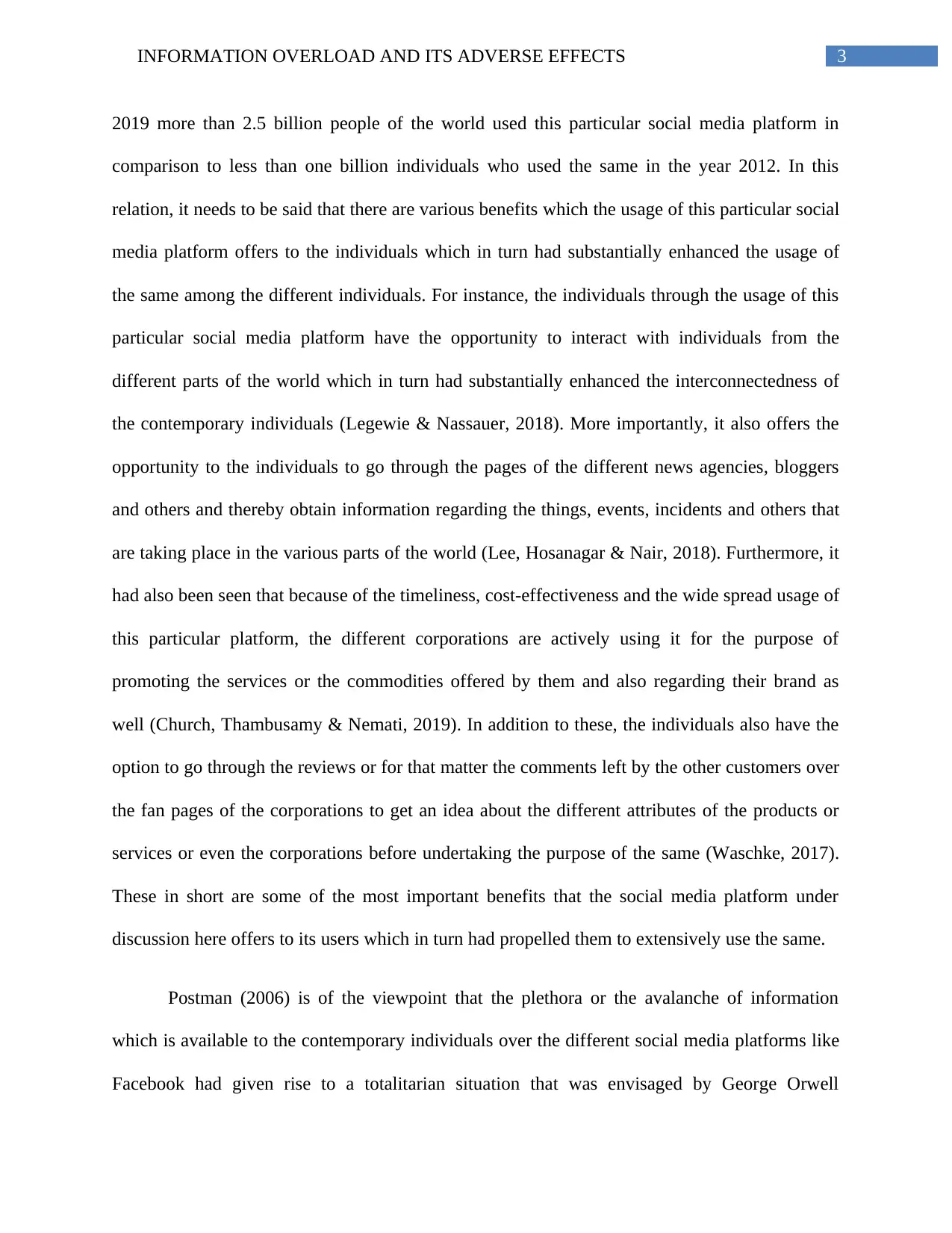
3INFORMATION OVERLOAD AND ITS ADVERSE EFFECTS
2019 more than 2.5 billion people of the world used this particular social media platform in
comparison to less than one billion individuals who used the same in the year 2012. In this
relation, it needs to be said that there are various benefits which the usage of this particular social
media platform offers to the individuals which in turn had substantially enhanced the usage of
the same among the different individuals. For instance, the individuals through the usage of this
particular social media platform have the opportunity to interact with individuals from the
different parts of the world which in turn had substantially enhanced the interconnectedness of
the contemporary individuals (Legewie & Nassauer, 2018). More importantly, it also offers the
opportunity to the individuals to go through the pages of the different news agencies, bloggers
and others and thereby obtain information regarding the things, events, incidents and others that
are taking place in the various parts of the world (Lee, Hosanagar & Nair, 2018). Furthermore, it
had also been seen that because of the timeliness, cost-effectiveness and the wide spread usage of
this particular platform, the different corporations are actively using it for the purpose of
promoting the services or the commodities offered by them and also regarding their brand as
well (Church, Thambusamy & Nemati, 2019). In addition to these, the individuals also have the
option to go through the reviews or for that matter the comments left by the other customers over
the fan pages of the corporations to get an idea about the different attributes of the products or
services or even the corporations before undertaking the purpose of the same (Waschke, 2017).
These in short are some of the most important benefits that the social media platform under
discussion here offers to its users which in turn had propelled them to extensively use the same.
Postman (2006) is of the viewpoint that the plethora or the avalanche of information
which is available to the contemporary individuals over the different social media platforms like
Facebook had given rise to a totalitarian situation that was envisaged by George Orwell
2019 more than 2.5 billion people of the world used this particular social media platform in
comparison to less than one billion individuals who used the same in the year 2012. In this
relation, it needs to be said that there are various benefits which the usage of this particular social
media platform offers to the individuals which in turn had substantially enhanced the usage of
the same among the different individuals. For instance, the individuals through the usage of this
particular social media platform have the opportunity to interact with individuals from the
different parts of the world which in turn had substantially enhanced the interconnectedness of
the contemporary individuals (Legewie & Nassauer, 2018). More importantly, it also offers the
opportunity to the individuals to go through the pages of the different news agencies, bloggers
and others and thereby obtain information regarding the things, events, incidents and others that
are taking place in the various parts of the world (Lee, Hosanagar & Nair, 2018). Furthermore, it
had also been seen that because of the timeliness, cost-effectiveness and the wide spread usage of
this particular platform, the different corporations are actively using it for the purpose of
promoting the services or the commodities offered by them and also regarding their brand as
well (Church, Thambusamy & Nemati, 2019). In addition to these, the individuals also have the
option to go through the reviews or for that matter the comments left by the other customers over
the fan pages of the corporations to get an idea about the different attributes of the products or
services or even the corporations before undertaking the purpose of the same (Waschke, 2017).
These in short are some of the most important benefits that the social media platform under
discussion here offers to its users which in turn had propelled them to extensively use the same.
Postman (2006) is of the viewpoint that the plethora or the avalanche of information
which is available to the contemporary individuals over the different social media platforms like
Facebook had given rise to a totalitarian situation that was envisaged by George Orwell
Paraphrase This Document
Need a fresh take? Get an instant paraphrase of this document with our AI Paraphraser
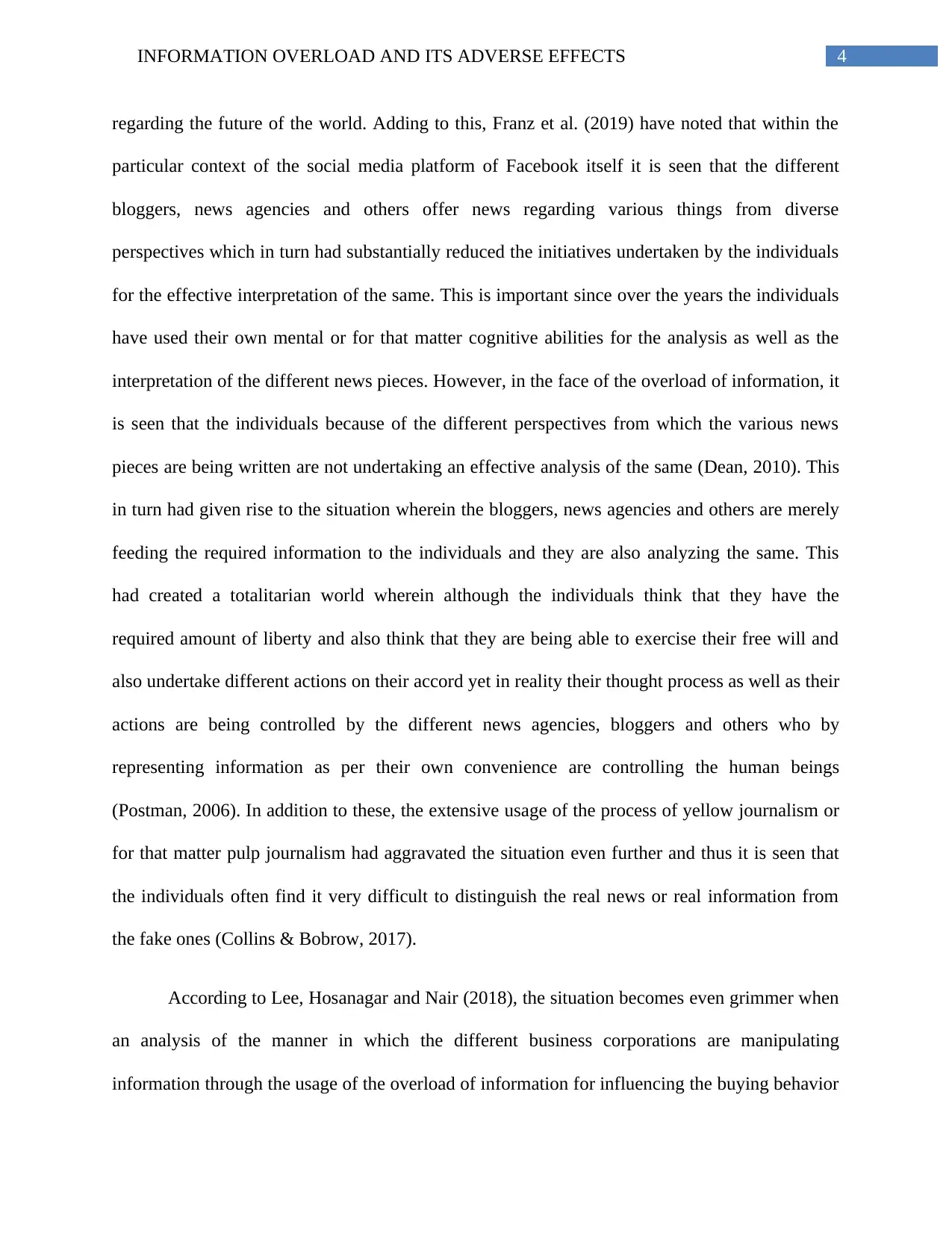
4INFORMATION OVERLOAD AND ITS ADVERSE EFFECTS
regarding the future of the world. Adding to this, Franz et al. (2019) have noted that within the
particular context of the social media platform of Facebook itself it is seen that the different
bloggers, news agencies and others offer news regarding various things from diverse
perspectives which in turn had substantially reduced the initiatives undertaken by the individuals
for the effective interpretation of the same. This is important since over the years the individuals
have used their own mental or for that matter cognitive abilities for the analysis as well as the
interpretation of the different news pieces. However, in the face of the overload of information, it
is seen that the individuals because of the different perspectives from which the various news
pieces are being written are not undertaking an effective analysis of the same (Dean, 2010). This
in turn had given rise to the situation wherein the bloggers, news agencies and others are merely
feeding the required information to the individuals and they are also analyzing the same. This
had created a totalitarian world wherein although the individuals think that they have the
required amount of liberty and also think that they are being able to exercise their free will and
also undertake different actions on their accord yet in reality their thought process as well as their
actions are being controlled by the different news agencies, bloggers and others who by
representing information as per their own convenience are controlling the human beings
(Postman, 2006). In addition to these, the extensive usage of the process of yellow journalism or
for that matter pulp journalism had aggravated the situation even further and thus it is seen that
the individuals often find it very difficult to distinguish the real news or real information from
the fake ones (Collins & Bobrow, 2017).
According to Lee, Hosanagar and Nair (2018), the situation becomes even grimmer when
an analysis of the manner in which the different business corporations are manipulating
information through the usage of the overload of information for influencing the buying behavior
regarding the future of the world. Adding to this, Franz et al. (2019) have noted that within the
particular context of the social media platform of Facebook itself it is seen that the different
bloggers, news agencies and others offer news regarding various things from diverse
perspectives which in turn had substantially reduced the initiatives undertaken by the individuals
for the effective interpretation of the same. This is important since over the years the individuals
have used their own mental or for that matter cognitive abilities for the analysis as well as the
interpretation of the different news pieces. However, in the face of the overload of information, it
is seen that the individuals because of the different perspectives from which the various news
pieces are being written are not undertaking an effective analysis of the same (Dean, 2010). This
in turn had given rise to the situation wherein the bloggers, news agencies and others are merely
feeding the required information to the individuals and they are also analyzing the same. This
had created a totalitarian world wherein although the individuals think that they have the
required amount of liberty and also think that they are being able to exercise their free will and
also undertake different actions on their accord yet in reality their thought process as well as their
actions are being controlled by the different news agencies, bloggers and others who by
representing information as per their own convenience are controlling the human beings
(Postman, 2006). In addition to these, the extensive usage of the process of yellow journalism or
for that matter pulp journalism had aggravated the situation even further and thus it is seen that
the individuals often find it very difficult to distinguish the real news or real information from
the fake ones (Collins & Bobrow, 2017).
According to Lee, Hosanagar and Nair (2018), the situation becomes even grimmer when
an analysis of the manner in which the different business corporations are manipulating
information through the usage of the overload of information for influencing the buying behavior
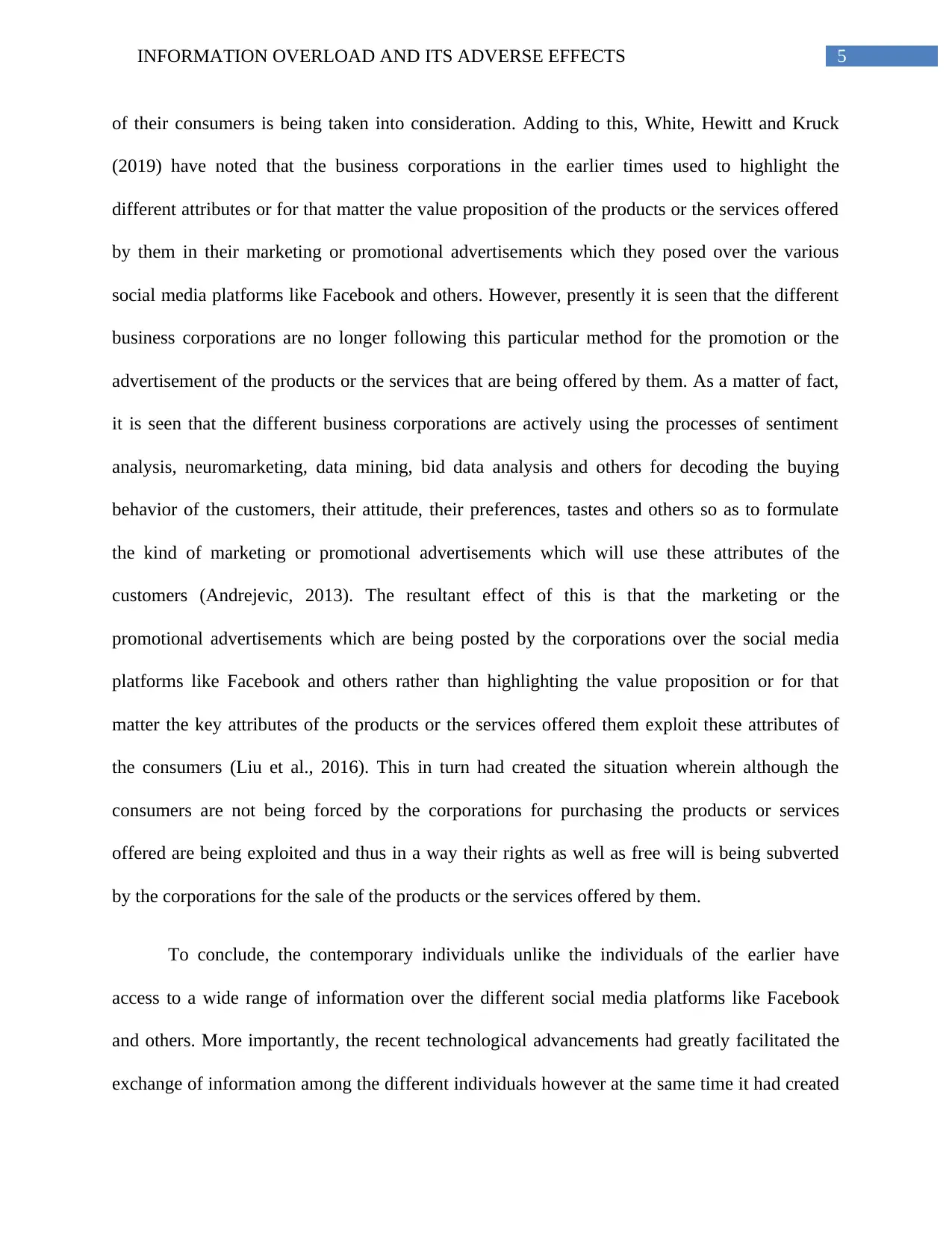
5INFORMATION OVERLOAD AND ITS ADVERSE EFFECTS
of their consumers is being taken into consideration. Adding to this, White, Hewitt and Kruck
(2019) have noted that the business corporations in the earlier times used to highlight the
different attributes or for that matter the value proposition of the products or the services offered
by them in their marketing or promotional advertisements which they posed over the various
social media platforms like Facebook and others. However, presently it is seen that the different
business corporations are no longer following this particular method for the promotion or the
advertisement of the products or the services that are being offered by them. As a matter of fact,
it is seen that the different business corporations are actively using the processes of sentiment
analysis, neuromarketing, data mining, bid data analysis and others for decoding the buying
behavior of the customers, their attitude, their preferences, tastes and others so as to formulate
the kind of marketing or promotional advertisements which will use these attributes of the
customers (Andrejevic, 2013). The resultant effect of this is that the marketing or the
promotional advertisements which are being posted by the corporations over the social media
platforms like Facebook and others rather than highlighting the value proposition or for that
matter the key attributes of the products or the services offered them exploit these attributes of
the consumers (Liu et al., 2016). This in turn had created the situation wherein although the
consumers are not being forced by the corporations for purchasing the products or services
offered are being exploited and thus in a way their rights as well as free will is being subverted
by the corporations for the sale of the products or the services offered by them.
To conclude, the contemporary individuals unlike the individuals of the earlier have
access to a wide range of information over the different social media platforms like Facebook
and others. More importantly, the recent technological advancements had greatly facilitated the
exchange of information among the different individuals however at the same time it had created
of their consumers is being taken into consideration. Adding to this, White, Hewitt and Kruck
(2019) have noted that the business corporations in the earlier times used to highlight the
different attributes or for that matter the value proposition of the products or the services offered
by them in their marketing or promotional advertisements which they posed over the various
social media platforms like Facebook and others. However, presently it is seen that the different
business corporations are no longer following this particular method for the promotion or the
advertisement of the products or the services that are being offered by them. As a matter of fact,
it is seen that the different business corporations are actively using the processes of sentiment
analysis, neuromarketing, data mining, bid data analysis and others for decoding the buying
behavior of the customers, their attitude, their preferences, tastes and others so as to formulate
the kind of marketing or promotional advertisements which will use these attributes of the
customers (Andrejevic, 2013). The resultant effect of this is that the marketing or the
promotional advertisements which are being posted by the corporations over the social media
platforms like Facebook and others rather than highlighting the value proposition or for that
matter the key attributes of the products or the services offered them exploit these attributes of
the consumers (Liu et al., 2016). This in turn had created the situation wherein although the
consumers are not being forced by the corporations for purchasing the products or services
offered are being exploited and thus in a way their rights as well as free will is being subverted
by the corporations for the sale of the products or the services offered by them.
To conclude, the contemporary individuals unlike the individuals of the earlier have
access to a wide range of information over the different social media platforms like Facebook
and others. More importantly, the recent technological advancements had greatly facilitated the
exchange of information among the different individuals however at the same time it had created
⊘ This is a preview!⊘
Do you want full access?
Subscribe today to unlock all pages.

Trusted by 1+ million students worldwide
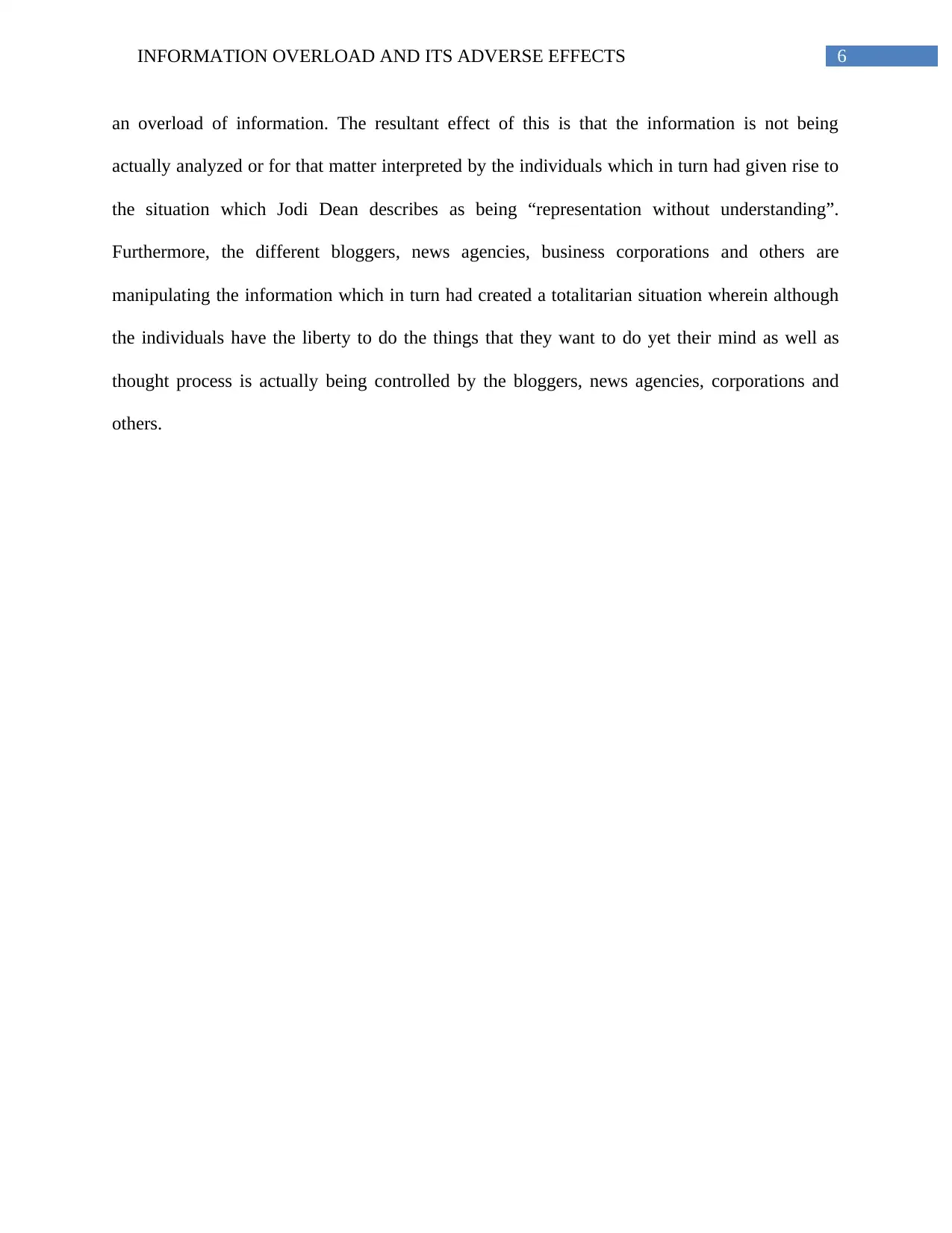
6INFORMATION OVERLOAD AND ITS ADVERSE EFFECTS
an overload of information. The resultant effect of this is that the information is not being
actually analyzed or for that matter interpreted by the individuals which in turn had given rise to
the situation which Jodi Dean describes as being “representation without understanding”.
Furthermore, the different bloggers, news agencies, business corporations and others are
manipulating the information which in turn had created a totalitarian situation wherein although
the individuals have the liberty to do the things that they want to do yet their mind as well as
thought process is actually being controlled by the bloggers, news agencies, corporations and
others.
an overload of information. The resultant effect of this is that the information is not being
actually analyzed or for that matter interpreted by the individuals which in turn had given rise to
the situation which Jodi Dean describes as being “representation without understanding”.
Furthermore, the different bloggers, news agencies, business corporations and others are
manipulating the information which in turn had created a totalitarian situation wherein although
the individuals have the liberty to do the things that they want to do yet their mind as well as
thought process is actually being controlled by the bloggers, news agencies, corporations and
others.
Paraphrase This Document
Need a fresh take? Get an instant paraphrase of this document with our AI Paraphraser
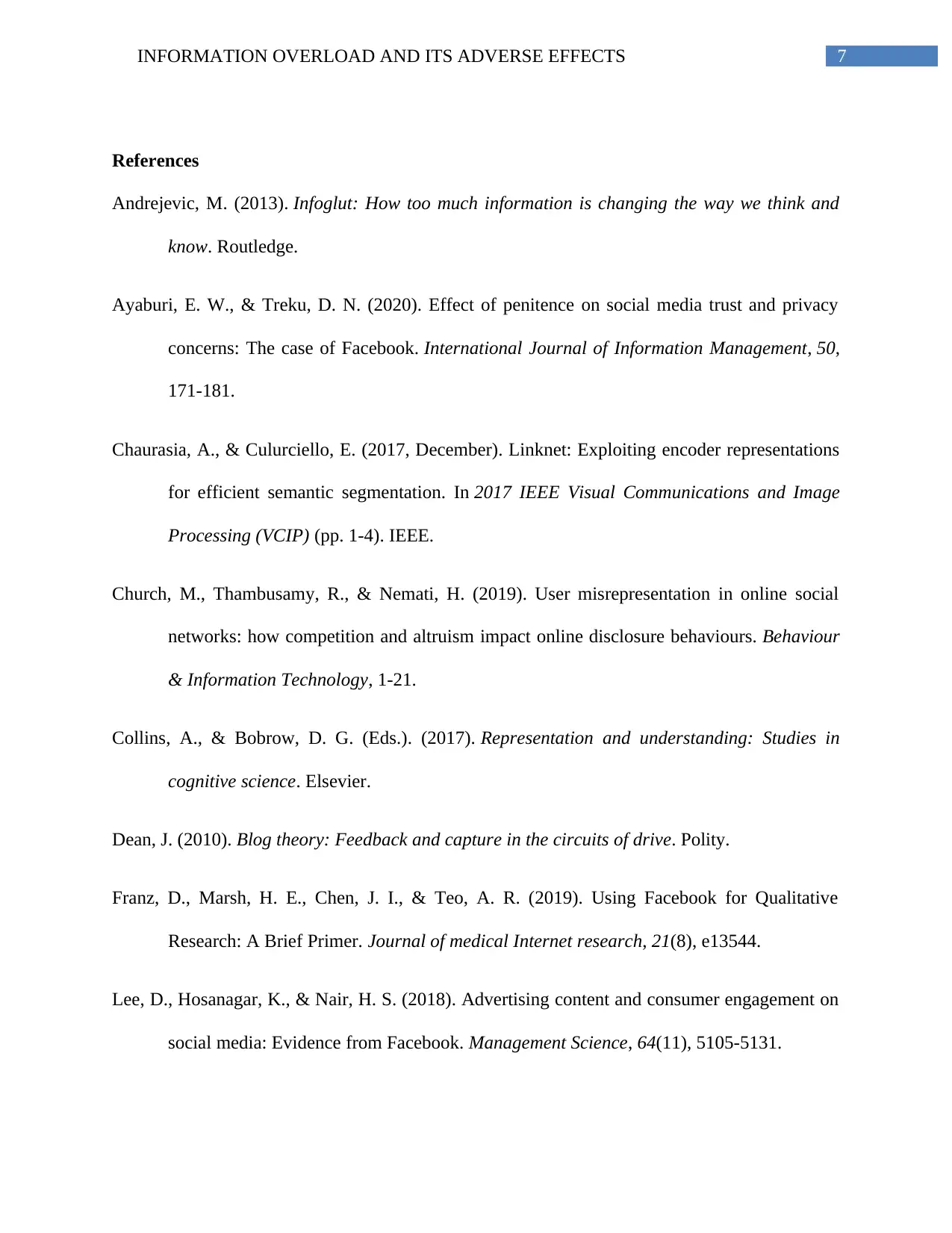
7INFORMATION OVERLOAD AND ITS ADVERSE EFFECTS
References
Andrejevic, M. (2013). Infoglut: How too much information is changing the way we think and
know. Routledge.
Ayaburi, E. W., & Treku, D. N. (2020). Effect of penitence on social media trust and privacy
concerns: The case of Facebook. International Journal of Information Management, 50,
171-181.
Chaurasia, A., & Culurciello, E. (2017, December). Linknet: Exploiting encoder representations
for efficient semantic segmentation. In 2017 IEEE Visual Communications and Image
Processing (VCIP) (pp. 1-4). IEEE.
Church, M., Thambusamy, R., & Nemati, H. (2019). User misrepresentation in online social
networks: how competition and altruism impact online disclosure behaviours. Behaviour
& Information Technology, 1-21.
Collins, A., & Bobrow, D. G. (Eds.). (2017). Representation and understanding: Studies in
cognitive science. Elsevier.
Dean, J. (2010). Blog theory: Feedback and capture in the circuits of drive. Polity.
Franz, D., Marsh, H. E., Chen, J. I., & Teo, A. R. (2019). Using Facebook for Qualitative
Research: A Brief Primer. Journal of medical Internet research, 21(8), e13544.
Lee, D., Hosanagar, K., & Nair, H. S. (2018). Advertising content and consumer engagement on
social media: Evidence from Facebook. Management Science, 64(11), 5105-5131.
References
Andrejevic, M. (2013). Infoglut: How too much information is changing the way we think and
know. Routledge.
Ayaburi, E. W., & Treku, D. N. (2020). Effect of penitence on social media trust and privacy
concerns: The case of Facebook. International Journal of Information Management, 50,
171-181.
Chaurasia, A., & Culurciello, E. (2017, December). Linknet: Exploiting encoder representations
for efficient semantic segmentation. In 2017 IEEE Visual Communications and Image
Processing (VCIP) (pp. 1-4). IEEE.
Church, M., Thambusamy, R., & Nemati, H. (2019). User misrepresentation in online social
networks: how competition and altruism impact online disclosure behaviours. Behaviour
& Information Technology, 1-21.
Collins, A., & Bobrow, D. G. (Eds.). (2017). Representation and understanding: Studies in
cognitive science. Elsevier.
Dean, J. (2010). Blog theory: Feedback and capture in the circuits of drive. Polity.
Franz, D., Marsh, H. E., Chen, J. I., & Teo, A. R. (2019). Using Facebook for Qualitative
Research: A Brief Primer. Journal of medical Internet research, 21(8), e13544.
Lee, D., Hosanagar, K., & Nair, H. S. (2018). Advertising content and consumer engagement on
social media: Evidence from Facebook. Management Science, 64(11), 5105-5131.
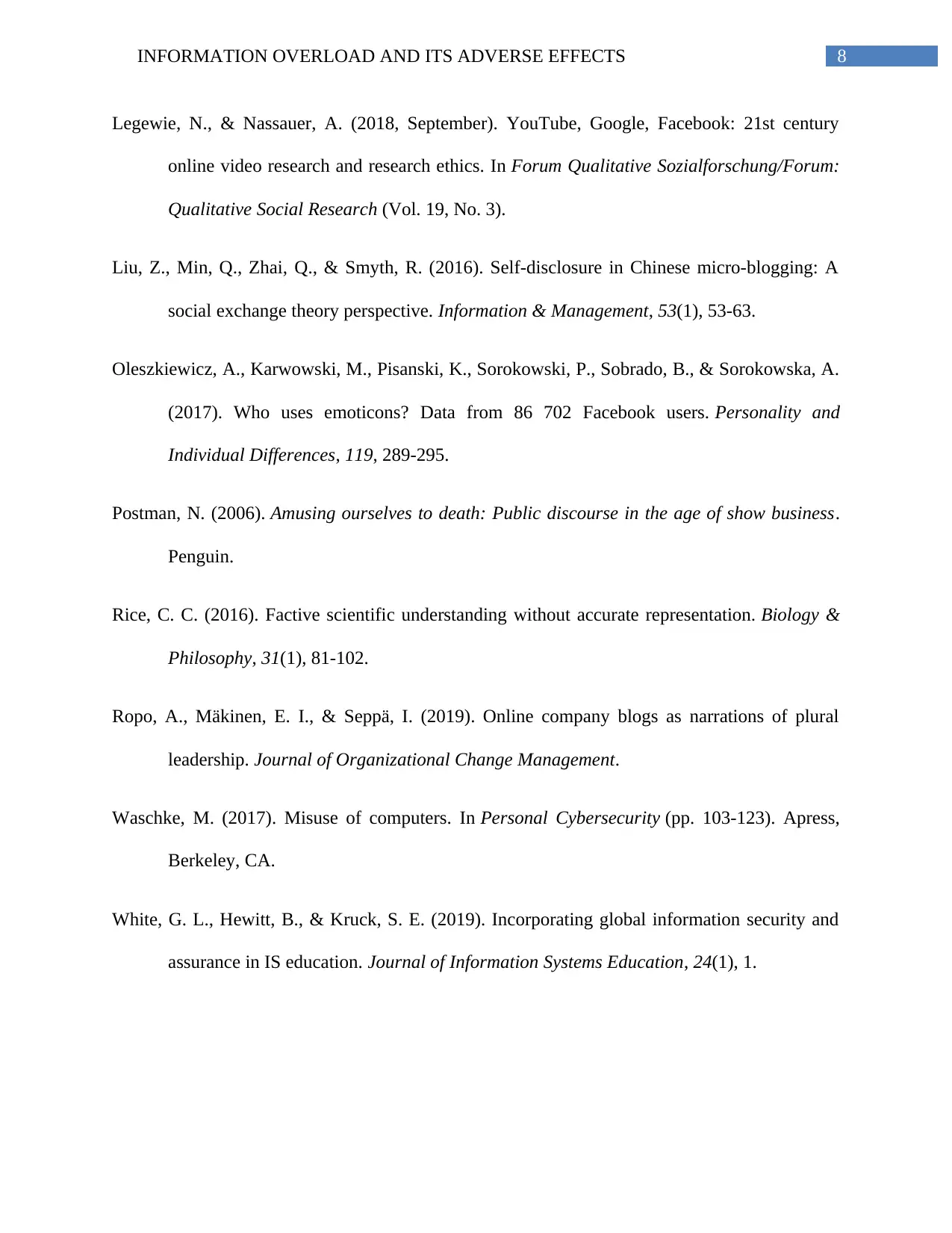
8INFORMATION OVERLOAD AND ITS ADVERSE EFFECTS
Legewie, N., & Nassauer, A. (2018, September). YouTube, Google, Facebook: 21st century
online video research and research ethics. In Forum Qualitative Sozialforschung/Forum:
Qualitative Social Research (Vol. 19, No. 3).
Liu, Z., Min, Q., Zhai, Q., & Smyth, R. (2016). Self-disclosure in Chinese micro-blogging: A
social exchange theory perspective. Information & Management, 53(1), 53-63.
Oleszkiewicz, A., Karwowski, M., Pisanski, K., Sorokowski, P., Sobrado, B., & Sorokowska, A.
(2017). Who uses emoticons? Data from 86 702 Facebook users. Personality and
Individual Differences, 119, 289-295.
Postman, N. (2006). Amusing ourselves to death: Public discourse in the age of show business.
Penguin.
Rice, C. C. (2016). Factive scientific understanding without accurate representation. Biology &
Philosophy, 31(1), 81-102.
Ropo, A., Mäkinen, E. I., & Seppä, I. (2019). Online company blogs as narrations of plural
leadership. Journal of Organizational Change Management.
Waschke, M. (2017). Misuse of computers. In Personal Cybersecurity (pp. 103-123). Apress,
Berkeley, CA.
White, G. L., Hewitt, B., & Kruck, S. E. (2019). Incorporating global information security and
assurance in IS education. Journal of Information Systems Education, 24(1), 1.
Legewie, N., & Nassauer, A. (2018, September). YouTube, Google, Facebook: 21st century
online video research and research ethics. In Forum Qualitative Sozialforschung/Forum:
Qualitative Social Research (Vol. 19, No. 3).
Liu, Z., Min, Q., Zhai, Q., & Smyth, R. (2016). Self-disclosure in Chinese micro-blogging: A
social exchange theory perspective. Information & Management, 53(1), 53-63.
Oleszkiewicz, A., Karwowski, M., Pisanski, K., Sorokowski, P., Sobrado, B., & Sorokowska, A.
(2017). Who uses emoticons? Data from 86 702 Facebook users. Personality and
Individual Differences, 119, 289-295.
Postman, N. (2006). Amusing ourselves to death: Public discourse in the age of show business.
Penguin.
Rice, C. C. (2016). Factive scientific understanding without accurate representation. Biology &
Philosophy, 31(1), 81-102.
Ropo, A., Mäkinen, E. I., & Seppä, I. (2019). Online company blogs as narrations of plural
leadership. Journal of Organizational Change Management.
Waschke, M. (2017). Misuse of computers. In Personal Cybersecurity (pp. 103-123). Apress,
Berkeley, CA.
White, G. L., Hewitt, B., & Kruck, S. E. (2019). Incorporating global information security and
assurance in IS education. Journal of Information Systems Education, 24(1), 1.
⊘ This is a preview!⊘
Do you want full access?
Subscribe today to unlock all pages.

Trusted by 1+ million students worldwide
1 out of 9
Related Documents
Your All-in-One AI-Powered Toolkit for Academic Success.
+13062052269
info@desklib.com
Available 24*7 on WhatsApp / Email
![[object Object]](/_next/static/media/star-bottom.7253800d.svg)
Unlock your academic potential
Copyright © 2020–2026 A2Z Services. All Rights Reserved. Developed and managed by ZUCOL.





